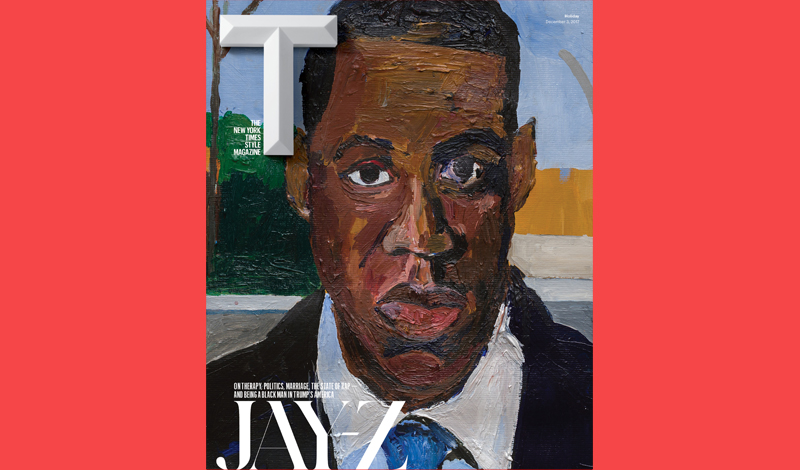Jay-Z had a full-blown painting done by artist Henry Taylor for his cover of the new issue of T Magazine—nothing but the best for one of the reigning kings of American culture! Inside the issue, the music mogul engages in a wide-ranging interview with The New York Times‘ executive editor Dean Baquet about being a black man in America, parenting, marriage, and his sense of self. Below are a few excerpts; read the full piece here.
On racism in America during the Donald Trump era:
“Yeah, there was a great Kanye West line in one of [his] songs: ‘‘Racism’s still alive, they just be concealin’ it.’ [‘‘Never Let Me Down,’’ from West’s 2004 album, The College Dropout.] Take a step back. I think when Donald Sterling got kicked out of the N.B.A., I thought it was a misstep, because when you kick someone out, of course he’s done wrong, right? But you also send everyone else back in hiding. People talk like that. They talk like that. Let’s deal with that. I wouldn’t just, like, leave him alone. It should have been some sort of penalties. He could have lost some draft picks. But getting rid of him just made everyone else go back into hiding, and now we can’t have the dialogue. The great thing about Donald Trump being president is now we’re forced to have the dialogue. Now we’re having the conversation on the large scale; he’s provided the platform for us to have the conversation.”
On raising his children:
“The most important thing I think out of all this is to teach compassion and to identify with everyone’s struggle and to know these people made these sacrifices for us to be where we are and to push that forward — for us. I believe that’s the most important thing to show them, because they don’t have to know things that I knew growing up. Like being tough.”
On therapy:
“I grew so much from the experience. But I think the most important thing I got is that everything is connected. Every emotion is connected and it comes from somewhere. And just being aware of it. Being aware of it in everyday life puts you at such a … you’re at such an advantage. You know, you realize that if someone’s racist toward you, it ain’t about you. It’s about their upbringing and what happened to them, and how that led them to this point. You know, most bullies bully. It just happen. Oh, you got bullied as a kid so you trying to bully me. I understand.”

